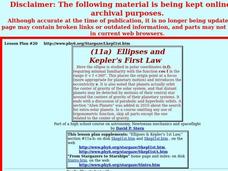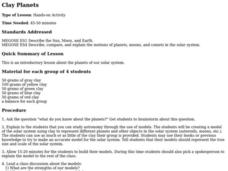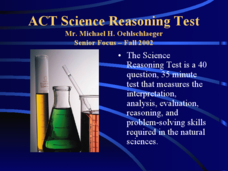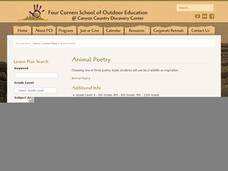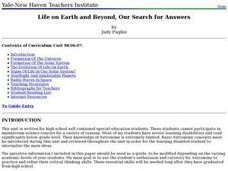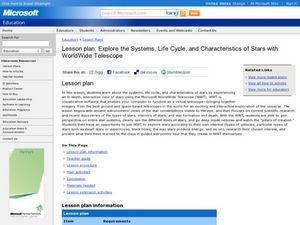Curated OER
Flying with Pythagoras
A lengthy narrative about Pythagoras and his students precedes an activity in which your young mathematicians practice using the Pythagorean theorem to solve three problems about flight and distance. Answers are provided.
Curated OER
Too Bright at Night?
Students reflect upon the causes and effects of light pollution in the night skies. First, they read articles provided and then do worksheets that are provided. They work in groups to discuss their conclusions.
Curated OER
Too Bright At Night?
Students explain what causes light pollution and how it can be curtailed. They consider the negative consequences of nighttime lighting, enabled by the invention of electric lights at the close of the 19th Century.
Curated OER
Vectors
High schoolers listen to a lecture and complete a number of problems as they go. There are a variety of examples given and they are guided through the problem solving steps for each of the real-world scenarios regarding the purpose of...
Curated OER
Ellipses and Kepler's First Law
The class examines graphs in the form r = F(¿¿) in polar coordinates (r, ¿¿), in particular with the circle, ellipse and other conic sections. They determine the nature of an ellipse by studying the role of the semimajor axis and...
Foreign Policy Research Institute
Islamic Civilization in Spain
There may be elements of this lesson that are useful for a unit on Islamic influence in Spain; however, there is little alignment between the learning objectives and the final product --a ten page report. For example, some of the...
Curated OER
Super Gelatin
Students investigate the refraction properties of gelatin to calculate its index of refraction. They discover that as the light travels through the gelatin, its speed and wavelength also change. Students find th indes of refraction of an...
Curated OER
Quiz: Name the Constellation
In this science worksheet, 3rd graders will focus on the stars and their constellations. Students will respond to ten questions, naming the constellation that is described in each.
Curated OER
Clay Planets
Have your class learn about the solar system using this hands on technique. Learners review what they know about the planets, and create a clay model of the solar system. There are a list of resource links to make this lesson a complete...
Curated OER
Multiplying and Dividing Decimals
Learn to multiply with decimals. The class reviews multiplying multi-digit whole numbers based off of word problems. Then they learn how to multiply using decimals and practice with money problems.
Curated OER
Houston, We Have a Problem! An Introductory Lesson for the unit Stars, Galaxies and the Universe
The lesson plan would make a stimulating introduction to a space unit. It is highly imaginative and suggests that the teacher darken the room to set the mood and dress as an astronaut. Teams are asked to help solve an imaginary problem...
Curated OER
ACT Science Reasoning Test
The types of scientific information that need to be analyzed in the ACT test are presented here. Tips and techniques for completing the research, data, viewpoints, and multiple choice questions will help your class and their expectations.
National Center for Case Study Teaching in Science
A Rose By Any Other Name
In part one, your astronomers read an interview dialogue between a reporter and Dr. Maria Ocasio, the chair of the group that assigns names to celestial objects. The topic in question is Pluto's status. Learners research Plutinos and...
Curated OER
Animal Poetry
Fourth graders write poems that use local wildlife as their inspiration. After a class discussion which produces a list of wildlife that pupils have seen in their town, a review of three types of poetry ensues. They look at how haiku,...
Curated OER
Sky Time: On the Astronomical Meaning of the Day, Year and Seasons
Learners simulate the movement of the Earth using their body motion. In this earth science instructional activity, students explain how this causes seasonal changes on Earth.
Curated OER
Life on Earth and Beyond, Our Search for Answers
Students in a special education classroom are introduced to how the universe and solar system was formed. Using the internet, they research the characteristics of Earth that support human life. In groups, they compare and contrast...
Curated OER
World In Motion Curriculum
Middle schoolers explore the night sky and its solar system. Using a Digitarium planetarium system, students observe four constellations. They discover the phases of the moon and eclipses. Middle schoolers recognize the difference...
Curated OER
Explore the Characteristics of Stars with Microsoft WorldWide Telescope
Students explore the characteristics of stars. In this space science activity, students use the Microsoft WorldWide Telescope program to identify the properties of stars and identify the stars in the galaxy.
Curated OER
Swinging on a Star
Students explore the issues that might arise if humans were to go on an interstellar space mission. They synthesize their understanding of interstellar travel by writing scenes from a science fiction novel that would depict such a mission.
Curated OER
Time Travel to the Edge of the Universe and Back!
Students analyze the size of the universe and calculate the time to travel to near and distant destinations.
Curated OER
The Solar System
High schoolers construct a sketch of the planets in our solar system using concentric circles and angles. In this solar system lesson plan, students plot the position of each planet on concentric circles using graph paper. The sun is...
Curated OER
Earth Science
Students explore the planets and celestial bodies in our solar system. In this outer space lesson, students identify the planets and record journal information about them and other celestial bodies. Students define outer space words.
Curated OER
Visual Vocabulary
Students use context clues to determine an understanding for vocabulary words in texts. In this vocabulary lesson plan, students recognize linguistic features in their readings to help them to figure out words.
Curated OER
Fifth Grade Language
In this language arts worksheet, 5th graders complete multiple choice questions about punctuation, parts of speech, research process and more. Students complete 25 questions.
Other popular searches
- Astronomy and Space Science
- Astronomy Vocabulary
- Planets and Astronomy
- Astronomy Activity
- Science Astronomy
- Ancient Astronomy
- Astronomy Lesson Plans
- History of Astronomy
- Space Science Astronomy
- Space and Astronomy
- Astronomy Navigation
- Astronomy History






